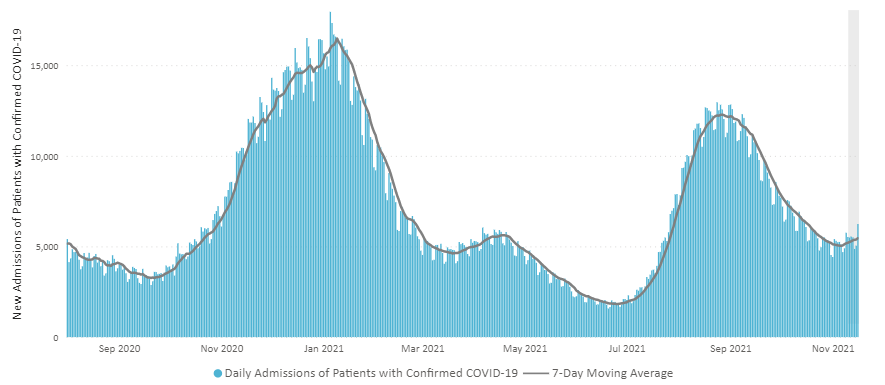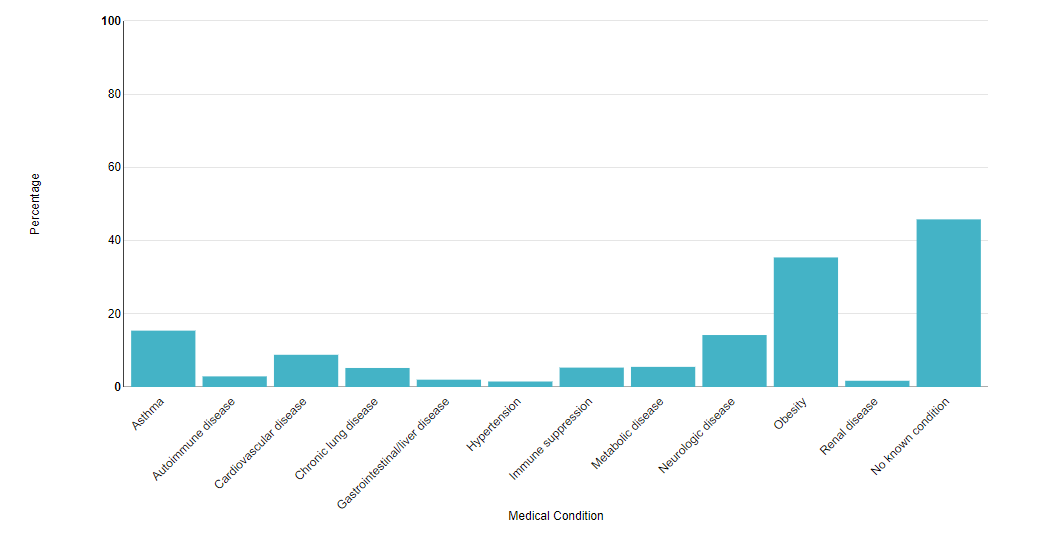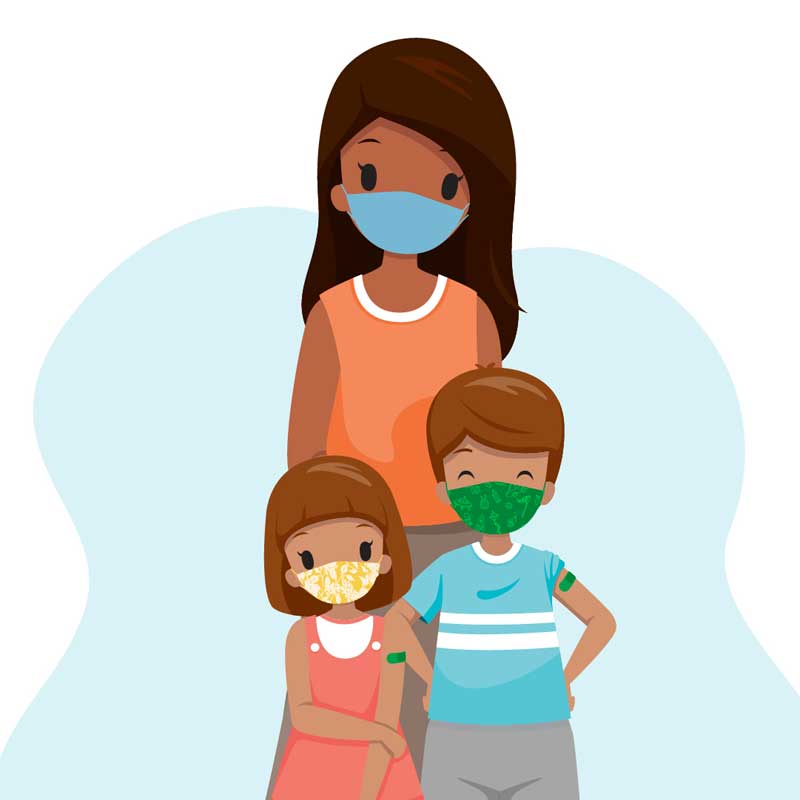Recommendations for Fully Vaccinated People
COVID-19 Homepage
Protecting Our Future
Interpretive Summary for November 19, 2021
Protecting Our Future
COVID-19 tends to be milder in children compared with adults, but it can make children very sick and lead to hospitalization or even death. To further protect children, those ages 5 years and older are now eligible to get an age-appropriate dose of Pfizer-BioNTech COVID-19 vaccine. Vaccinating children is also a crucial step toward stopping the spread of the virus that causes COVID-19 and ending the pandemic.
This week CDC’s COVID Data Tracker shows that rates of COVID-19 hospitalizations remain high in children between the ages of 5 through 11 years. A recent study of more than 2,000 children under 18 years found that nearly 1 in 3 children hospitalized with COVID-19 were admitted to the intensive care unit or put on a ventilator. Although children with underlying medical conditions are at increased risk for more severe illness from COVID-19, almost half (45%) of the hospitalized children in this study had no known underlying medical conditions. These results show that children can be severely affected by COVID-19.
Widespread vaccination for COVID-19 remains a critical tool to best protect everyone, especially those at highest risk, from severe illness and death. CDC recommends everyone ages 5 years and older get a COVID-19 vaccine to help protect against COVID-19. Vaccinating children ages 5 years and older can help keep them in school and safely participate in sports, playdates, and other group activities. Vaccinating children can also help protect family members, including siblings who are not eligible for vaccination and family members who may be at increased risk of getting very sick if they are infected. COVID-19 vaccines for children ages 5 through 11 years are now available at pediatricians’ offices, pharmacies, Federally Qualified Health Centers, and more. To find a vaccination site near you, visit vaccines.gov; text your ZIP code to 438829 (GETVAX); or call 1-800-232-0233. If you have questions about COVID-19 vaccines in children, talk with your child’s pediatrician or healthcare provider.
Note to readers: In observance of the Thanksgiving holiday, CDC will not publish the COVID Data Tracker Weekly Review on Friday, November 26, 2021. The Weekly Review will resume publication on Friday, December 3, 2021.
- COVID Data Tracker’s Vaccinations in the US, Vaccination Demographics, and Vaccination Demographic Trends tabs now include people ages 5 years and older for all vaccine metrics.
- COVID Data Tracker’s Hospitalizations by Vaccination Status – COVID-NET tab now includes data on adolescents between the ages of 12 through 17 years.
- COVID Data Tracker’s Vaccination Equity tab now displays trends in the average percent of the population fully vaccinated, stratified by urban/rural status.
- The Advisory Committee on Immunization Practices’ Interim Recommendations for Additional Primary and Booster Doses of COVID-19 Vaccines — United States, 2021
- Incidence of SARS-CoV-2 Infection, Emergency Department Visits, and Hospitalizations Because of COVID-19 Among Persons Aged ≥12 Years, by COVID-19 Vaccination Status — Oregon and Washington, July 4–September 25, 2021 | MMWR (cdc.gov)
- Risk for Stillbirth Among Women With and Without COVID-19 at Delivery Hospitalization — United States, March 2020–September 2021
- COVID-19–Associated Deaths After SARS-CoV-2 Infection During Pregnancy — Mississippi, March 1, 2020–October 6, 2021
- COVID-19 Severity among Women of Reproductive Age with Symptomatic Laboratory-Confirmed SARS-CoV-2 by Pregnancy Status – United States, Jan 1, 2020 – Sep 30, 2021External
Reported Cases
The current 7-day moving average of daily new cases (88,482) increased 16.1% compared with the previous 7-day moving average (76,223). A total of 47,352,367 COVID-19 cases have been reported as of November 17, 2021.
Currently, Delta is the only variant classified as a Variant of Concern (VOC) in the United States. Nowcast projections* for the week ending November 13, 2021, estimate the national and regional proportions of Delta to be greater than 99%. CDC continues to monitor variants and additional information may be provided in future editions based on current trends. For more information on variant proportions, visit COVID Data Tracker.
47,352,367
Total Cases Reported
47,352,367
Total Cases Reported
88,482
Current 7-Day Average**
88,482
Current 7-Day Average**
76,223
Prior 7-Day Average
76,223
Prior 7-Day Average
+16.1%
Change in 7-Day Average since Prior Week
+16.1%
Change in 7-Day Average since Prior Week
*The median time from specimen collection to sequence data reporting is about 3 weeks. As a result, weighted estimates for the most recent few weeks may be unstable or unavailable. CDC’s Nowcast is a data projection tool that helps fill this gap by generating timely estimates of variant proportions for variants that are circulating in the United States. View Nowcast estimates on CDC’s COVID Data Tracker website on the Variant Proportions page.
**Historical cases are excluded from daily new cases and 7-day average calculations until they are incorporated into the dataset for the applicable date. Of 335,974 historical cases reported retroactively, 16,290 were reported in the current week and 3,197 were reported in the prior week.
Vaccinations
The U.S. COVID-19 Vaccination Program began December 14, 2020. As of November 17, 2021, 444.8 million vaccine doses have been administered. Overall, about 228.2 million people, or 68.7% of the total U.S. population, have received at least one dose of vaccine. About 195.6 million people, or 58.9% of the total U.S. population, have been fully vaccinated.* About 31.5 million additional/booster doses in fully vaccinated people have been reported. As of November 17, 2021, the 7-day average number of administered vaccine doses reported (by date of CDC report) to CDC per day was 1,471,757, a 11.8% increase from the previous week.
CDC’s COVID Data Tracker Vaccination Demographic Trends tab shows vaccination trends by age group. As of November 17, 2021, 99.5% of people ages 65 years or older have received at least one dose of vaccine and 86.2% are fully vaccinated. More than three-quarters (81.7%) of people ages 18 years or older have received at least one dose of vaccine and 70.7% are fully vaccinated. For people ages 12 years or older, 79.8% have received at least one dose of vaccine and 68.9% are fully vaccinated. For people ages 5 years or older, 73.1% have received at least one dose of vaccine and 62.6% are fully vaccinated.
444,789,186
Vaccines Administered
444,789,186
Vaccines Administered
228,175,638
People who received at least one dose
228,175,638
People who received at least one dose
195,612,365
People who are fully vaccinated*
195,612,365
People who are fully vaccinated*
68.7%
Percentage of the US population that has received at least one dose
68.7%
Percentage of the US population that has received at least one dose
58.9%
Percentage of the US population that has been fully vaccinated*
58.9%
Percentage of the US population that has been fully vaccinated*
+1.0
Percentage point increase from last week
+1.0
Percentage point increase from last week
+0.4
Percentage point increase from last week
+0.4
Percentage point increase from last week
*Represents the number of people who have received the second dose in a two-dose COVID-19 vaccine series (such as the Pfizer or Moderna vaccines) or one dose of the single-shot Johnson & Johnson’s Janssen vaccine.
Hospitalizations
New Hospital Admissions
The current 7-day daily average for November 10–November 16, 2021, was 5,456. This is a 5.4% increase from the prior 7-day average (5,176) from November 3–November 9, 2021.
3,334,715
Total New Admissions
3,334,715
Total New Admissions
5,456
Current 7-Day Average
5,456
Current 7-Day Average
5,176
Prior 7-Day Average
5,176
Prior 7-Day Average
+5.4%
Change in 7-Day Average
+5.4%
Change in 7-Day Average
The start of consistent reporting of hospital admissions data was August 1, 2020.
Daily Trends in Number of New COVID-19 Hospital Admissions in the United States

New admissions are pulled from a 10 am EST snapshot of the HHS Unified Hospital Timeseries Dataset. Due to potential reporting delays, data from the most recent 7 days, as noted in the figure above with the grey bar, should be interpreted with caution. Small shifts in historic data may also occur due to changes in the Centers for Medicare and Medicaid Services (CMS) Provider of Services file, which is used to identify the cohort of included hospitals.
COVID-NET: Children and Adolescents Hospitalized with COVID-19 with Underlying Conditions
CDC’s Coronavirus Disease 2019-Associated Hospitalization Surveillance Network (COVID-NET) shows that having certain medical conditions can increase the risk of becoming severely ill due to COVID-19. Data from March 1, 2020 through September 30, 2021, show that 54% of children and adolescents ages 17 years and younger with a laboratory-confirmed COVID-19-associated hospitalization have at least one underlying medical condition. Among children with a COVID-19-associated hospitalization, the most common underlying medical conditions include obesity (36%), asthma (15%), neurologic disease (14%), and cardiovascular disease (9%).
Information on risk factors for severe outcomes in COVID-19-associated hospitalizations among children can be found in a new report using COVID-NET data hereExternal.
Information on COVID-19 and underlying medical conditions can be found on CDC’s website.
Children and Adolescents Hospitalized with COVID-19 with Underlying Conditions

The Coronavirus Disease 2019 (COVID-19)-Associated Hospitalization Surveillance Network (COVID-NET) is an additional source for hospitalization data collected through a network of more than 250 acute-care hospitals in 14 states (representing ~10% of the U.S. population). Detailed data on patient demographics, including race/ethnicity, underlying medical conditions, medical interventions, and clinical outcomes, are standardized case reporting form.
Deaths
The current 7-day moving average of new deaths (1,032) has decreased 2.4% compared with the previous 7-day moving average (1,058). As of November 17, 2021, a total of 764,473 COVID-19 deaths have been reported in the United States.
764,473
Total Deaths Reported
764,473
Total Deaths Reported
1,032
Current 7-Day Average*
1,032
Current 7-Day Average*
1,058
Prior 7-Day Average
1,058
Prior 7-Day Average
-2.4%
Change in 7-Day Average Since Prior Week
-2.4%
Change in 7-Day Average Since Prior Week
*Historical deaths are excluded from the daily new deaths and 7-day average calculations until they are incorporated into the dataset by their applicable date. Of 11,279 historical deaths reported retroactively, 271 were reported in the current week; and 167 were reported in the prior week.
Daily Trends in Number of COVID-19 Deaths in the United States Reported to CDC

7-Day moving average
Testing
The percentage of COVID-19 NAATs (nucleic acid amplification tests)* that are positive (percent positivity) has increased from the previous week. The 7-day average of percent positivity from NAATs is now 6.0%. The 7-day average number of tests reported for November 5 – November 11, 2021, was 1,396,881, up 4.0% from 1,342,728 for the prior 7 days.
647,335,547
Total Tests Reported
647,335,547
Total Tests Reported
1,396,881
7-Day Average Tests Reported
1,396,881
7-Day Average Tests Reported
6.0%
7-Day Average % Positivity
6.0%
7-Day Average % Positivity
5.1%
Previous 7-Day Average % Positivity
5.1%
Previous 7-Day Average % Positivity
+0.93
Percentage point change in 7-Day Average % Positivity since Prior Week
+0.93
Percentage point change in 7-Day Average % Positivity since Prior Week
*Test for SARS-CoV-2, the virus that causes COVID-19

